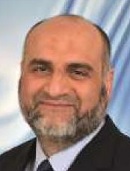* Invited and Regular Papers will be published in various Indexed Journals (ISI, SCOPUS, EBSCO, DBLP, ACM, IET/INSPEC, Proquest, Copernicus etc...) based on quality and reviewers' recommendations or in our Books in Springer Verlag. Click here






* Authors will be informed about the title of the Journal before
their registration.
* Contact us by email:
support@inase.org Registration fees
Publication Ethics and Malpractice Statement
Deadlines
(Previous Conference: INDE 2016, Corfu Island, Greece, July 14-17, 2016)
PLENARY SPEAKERS:

Prof. Ahmed Al-Ashaab, Manufacturing Department, Cranfield University, UK, e-mail: a.al-ashaab@cranfield.ac.uk
Title: "Industrial Experiences of Applying Set-Based Concurrent Engineering"
Abstract: The increased international competition in the current open global market is putting pressure on companies to improve the performance of their product development. This is to sustain and improve market share through the production of a high quality product in a cost effective manner in shorter time. This is because organisational survival and long-term growth depends on the introduction and development of new products. Manufacturing companies are in need of a new model that goes beyond lean manufacturing to ensure the transformation of the enterprise into lean environment. The author believes that significant change in enterprise performance can come from the adoption of lean thinking throughout the entire product life cycle. This is the Lean Product and Process Development (LeanPPD) process model. The whole objective of lean is the elimination of waste. This is good to achieve, but an isolated success within a manufacturing company is not sufficient. What is needed is a new paradigm that will take the lean manufacturing concepts from waste elimination into value creation. In order to make a significant change in enterprise performance and saving ultimate system costs, there is a need for the entire enterprise to undergo a lean transformation. LeanPPD is the application of lean thinking in product design, engineering and development. It focuses on value creation, provision of knowledge environment, continuous improvement and set-based concurrent engineering process that encourage innovation and collaboration. LeanPPD provides and process model and associate tools that consider entire product life cycle. It provides knowledge based user centric design and development environment to support value creation to the customers in term of innovation and customisation, quality as well as sustainable and affordable products. Set-based Concurrent Engineering is the core enable of the LeanPPD model. Design participants practice SBCE by reasoning, developing, and communicating about sets of solutions in parallel. As the design progresses, they gradually narrow their respective sets of solutions based on the knowledge gained and they commit to staying within the sets so that others can rely on their communication. SBCE is the core enable of the LeanPPD model and it has been developed based on the following key principles; 1) Strategic value research and alignment, 2) Map the design Space, 3) Create and explore multiple concepts in parallel, 4) Integrate by intersection and 5) Establish feasibility before commitment. This plenary speech will present an overview of the SBCE process model and the different experiences of applying set-based concurrent engineering in real industrial projects. The presentation will highlight the important and the benefits SBCE appliactions.